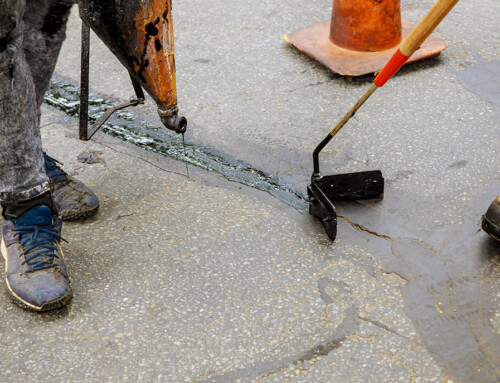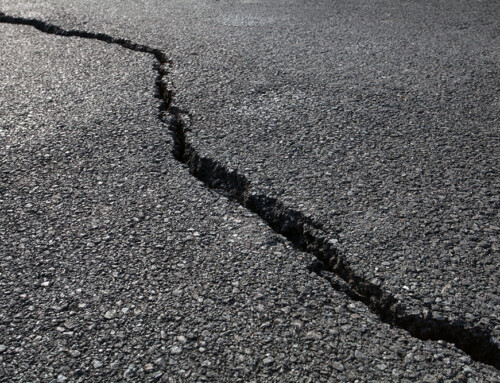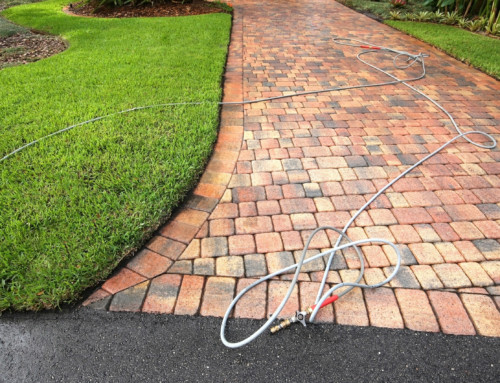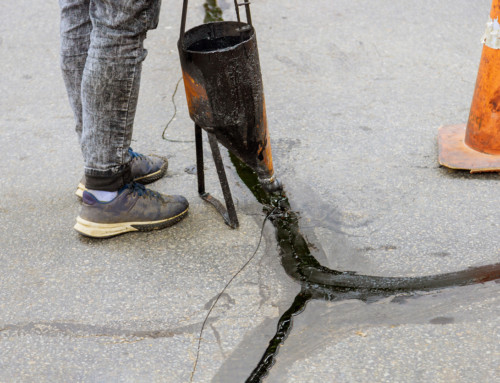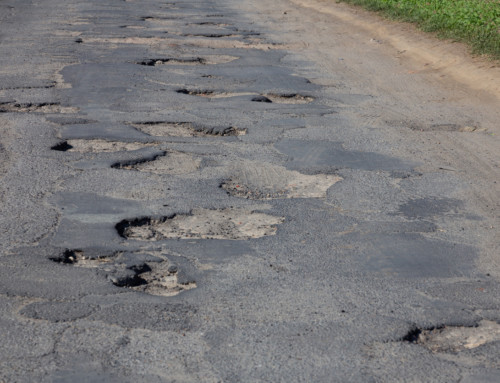
An asphalt driveway is a big investment, so it’s important to address any needed repairs promptly to keep it in its best condition. Small cracks and other minor issues are easy to remedy if caught early enough, and staying on top of these will ensure that the asphalt driveway has the longest lifespan possible. If minor damage to the asphalt is left untreated for too long, it can quickly turn into a major issue that requires extensive and costly work to correct. However, many property owners are in the dark about how to repair an asphalt driveway, or may not realize that leaving small repairs undone will cause bigger problems in the future. In this post, we’ll go over the steps all asphalt driveway owners need to take when tackling asphalt damage big and small.
Assess the Damage
The first thing to do is to assess the severity of the damage in question. For small cracks (less than ½” in width) or minor dips or holes that have not penetrated through to the sublayers of the asphalt, a home DIY repair may be possible. However, for anything beyond this, calling in a professional for expert help is recommended. Attempting to fix a larger crack or more significant damage on your own is a recipe for disaster, as many people often overlook the impact damage has to the foundational layers of the driveway. Any penetration of the asphalt sublayers can lead to instability in the driveway structure, creating a much bigger problem and even a possible collapse.
Determine Best Repair Method
Once you’ve determined the severity of damage you’re dealing with, it’s time to decide on the best repair method for your asphalt driveway:
Patching
If you’ve caught the cracking or damage early, DIY patching is a possible solution. There are many DIY asphalt patching products available on the market that are easy for anyone with a little fixer-upper experience to use. Simply clean and smooth out the damaged area as much as possible, then apply the patching solution to the damaged area per the manufacturer’s instructions. Be sure to allow plenty of time for the patch to properly dry and cure before driving over it!
If you’re attempting to patch cracks over ½” in width or larger dips or holes, call a professional now! While DIY products may claim that they can fix larger areas of damage, they often just fill in the area without addressing potential damage or penetration of the sublayers, leaving a weak spot in the driveway that will need to be fixed again in just a short time.
Resurfacing
If you are dealing with multiple areas of damage on your asphalt driveway, or larger cracks, holes, and dips, resurfacing may be your best option. Resurfacing involves repairing all cracks or other areas of damage, leveling the driveway surface, then applying a fresh new layer of asphalt to the top of the entire driveway surface. Resurfacing should be done by professionals only and should be part of your asphalt driveway maintenance plan.
Replacement
For asphalt damage that is severe or penetrates far beneath the surface, full replacement may be the only reasonable solution. Asphalt driveway replacement is another job that should be done by professionals only, as it requires completely removing the existing driveway, including all sublayers, and starting again from the ground up. Full replacement is the costliest of all repair options, but owners who neglect to maintain their asphalt driveways may find themselves with no other choice.
Preventative Maintenance
Finally, no discussion about repairing an asphalt driveway would be complete without mentioning the importance of preventative maintenance. Preventative maintenance is the cornerstone of keeping any asphalt surface in great shape. The preventative maintenance plan for your asphalt driveway should be four-pronged:
- Regular Inspections – Inspect your asphalt driveway for signs of wear and damage every month.
- Patching/Repairs – Any damage noticed during monthly inspections should be patched immediately if possible. If a DIY patch is not enough, call a professional asphalt company for repairs as soon as possible.
- Sealcoating – At least once every 2-5 years you should have the asphalt driveway sealcoated. Sealcoating adds a protective layer to the surface of the driveway, preventing the oxidation of the asphalt’s binding materials and helping maintain its strength. For driveways under heavy use, yearly sealcoating may be required.
- Resurfacing – Every 10 years, plan to have the entire asphalt driveway resurfaced. This will eliminate cracks and damage that are hiding within the top layer of asphalt and give your driveway that fresh, just poured look. Resurfacing on a regular schedule will also extend the life of the driveway so that complete replacement can be put off as long as possible.
Get Expert Asphalt Repair Help From TopWest Asphalt in Abbotsford
Diligence and dedication to prompt repairs are paramount for keeping any asphalt surface in proper working order. By repairing cracks and damage as soon as they are noticed, you can avoid more extensive and costly repairs down the road. Weekend DIY warriors can attempt small patch repairs on their own, but for more significant damage, leaving it to the professionals is the best bet. If you’re in the southeastern Vancouver metro, including Abbotsford, Gifford, Aberdeen, Kilgard, and Sumas, trust your asphalt repair needs to the pros at TopWest Asphalt Ltd. Our experts can help with everything from routine inspections to minor repairs to complete replacement, so you’ll never have to worry about the integrity or appearance of your asphalt driveway. For more information or to schedule a free quote, call us at 604 755 0300 or email info@topwestasphalt.com.

